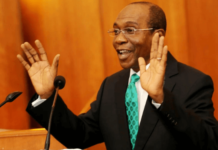 The Senate has rejected the N4bn appropriated for the construction of the First Ladies Mission in Africa.
The Senate has rejected the N4bn appropriated for the construction of the First Ladies Mission in Africa.
The Mission is being headed by Nigeria’s First Lady, Dame Patience Jonathan.
The amount was proposed in the estimate of the Federal Capital Territory’s, FCT, 2013 budget appropriation.
This was as the lawmakers appropriated N259.65bn with a surplus of N48.71bn for the FCT 2013 statutory budget.
This year’s budget is less than that of 2012 fiscal year, which was N306.41bn.
The senators described the financial allocation for the construction of the secretariat in Abuja as a misplaced priority.
The lawmakers said that the N4bn would be distributed for the provision of infrastructure and meet the pressing needs in satellite towns.
The senators also explained that they disapproved the allocation because the land upon which the proposed secretariat would be sited is currently under litigation.
“We cannot appropriate for a land that is not available,” they added.
A Federal High Court in Abuja had ruled that the land proposed by the FCT Ministry for the first ladies’ building belonged to an organisation owned by wife of the late President Umaru Yar’Adua, Turai after a protracted legal battle.
A breakdown of the appropriation report, presented by the Senate Committee Chairman on FCT, Senator Smart Adeyemi (PDP Kogi- West) showed that N48.6bn, representing 18.7 per cent, was approved for personnel costs.
Also N50.58bn, representing 19.5 per cent, was for overhead costs while N160.46 representing 61.8 per cent was for capital projects for the 2013 fiscal year.
A further breakdown of the budget indicated that the total recurrent expenditure stood at N99.18bn, representing 38.2 per cent while the entire budget stood at N259.64bn.
Adeyemi urged his colleagues to consider the budget because of time constraints since a lot of work needs to be done in the ongoing year.
He said the committee, in carrying out its oversight duties, identified critical areas for development of the territory and ensure improved standard of living for its inhabitants.
“The committee jostled with the budget estimates, deploying funds to meet areas of critical needs like roads, water, health, education and development of satellite towns within the territory, city maintenance and cleaning, recreational facilities, construction of rehabilitation centres, agriculture, transportation, security services and rehabilitation of ECOWAS Parliament Building”, he said.
Adeyemi said his committee noted that the performance of the statutory allocation in 2012 was only 43 per cent, saying most of the projects earmarked for the year were still ongoing due to what he referred to as “overbearing ineptitude of getting the Due Process Certificate”.
“It was further observed that new and ongoing projects were not sufficiently funded due to delay in the release of funds occasioned by bureaucratic bottlenecks,” he added.
Senate President David Mark, who presided over the session, said that the nation’s capital had not lived up to expectation, stressing that the administrators must urgently sit up.
According to Mark: “The FCT is supposed to be a model town, a model capital city, and having passed this budget, we expect that the FCT will be a model capital city where everything functions, where we must get all the roads to be okay.
“I think there isn’t enough satellite development going on. And so there is a lot of congestion in town. Street lights are not working, the streets are not being kept in very good condition, the gardens and lawns are not being maintained. I think there are a lot of areas where FCT has to work very properly.”
The Senate President advised the relevant Senate committees on FCT to carry out oversight functions with a view to repositioning the area.
“This is where we have to employ your oversight functions, our responsibility, to make sure that things work properly,” he said.
Meanwhile, the House of Representatives for the umpteenth time yesterday, shelved the proposed amendments to the 2013 Appropriation bill referring it to a joint committee.
The House made the referral to its Committees on Judiciary, Justice and Business and Rules after considering a Constitutional Order raised by Hon. Yakubu Dogara
Dogara in his Order, warned that the passage of the proposed amendments by the President would be in serious breach of section 81 subsections 1, 2, 3 and 4 of the constitution.
He also told the House that contrary to the section, the said proposals from the Presidency could not be defined and therefore had no place in the litany of legislative items the Green Chamber should consider.
He also argued that instead of bringing forth a supplementary budget at this time, the President was bringing in the same proposals he earlier presented before a joint session.
Section 81(1) states that: “The President shall cause to be prepared and laid before each House of the National Assembly at any time in each financial year estimates of the revenues and expenditure of the Federation for the next following financial year.”
Dogara’s objection had overwhelming support among members of the House leading to a summary referral of the proposed amendments by Speaker Aminu Tambuwal to the committees.
The House also took on a bill proposing that 40 per cent of Nigeria’s annual national budget must be dedicated to capital projects over the next 10 years through the second reading.
The sponsor of the Bill, Hon. Femi Gbajabiamila, who led debate on the Bill, said that 70 per cent of the annual budget is allocated to recurrent expenditure while a paltry 30 per cent was allocated to capital expenditure for the last 10 years.
According to him: “This bill has the capacity to affect the lives of Nigerians and that of our constituents. The intention of the bill is to fund capital projects for the next 10 years, because this will stimulate our economy for the good.”
He explained further that even the 30 per cent capital projects allocations were not properly utilised as shown by official statistics.
In supporting the bill, Deputy Leader of the House, Hon. Leo Ogor, said there was a need to determine the mechanism and manner with which funds could be appropriated and applied.
The Chairman, House Committee on Appropriation, Hon. John Enoh, said that in the last several years, the Executive has had difficulties in trying to bridge the gap between recurrent and capital expenditures, hence the need to fix a percentage for infrastructure development.
Hon. Patrick Ikhariale and Hon. Ossai Nicholas Ossai, however kicked against the bill, arguing that the constitution was very clear on the role of the legislature in appropriation of funds and the House would be going contrary to its provisions in making the law.





what is the use of building first ladies house?? Thank God it was not approve..